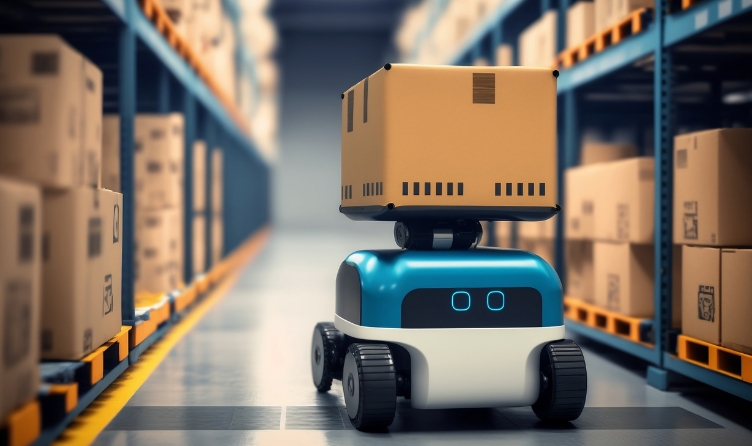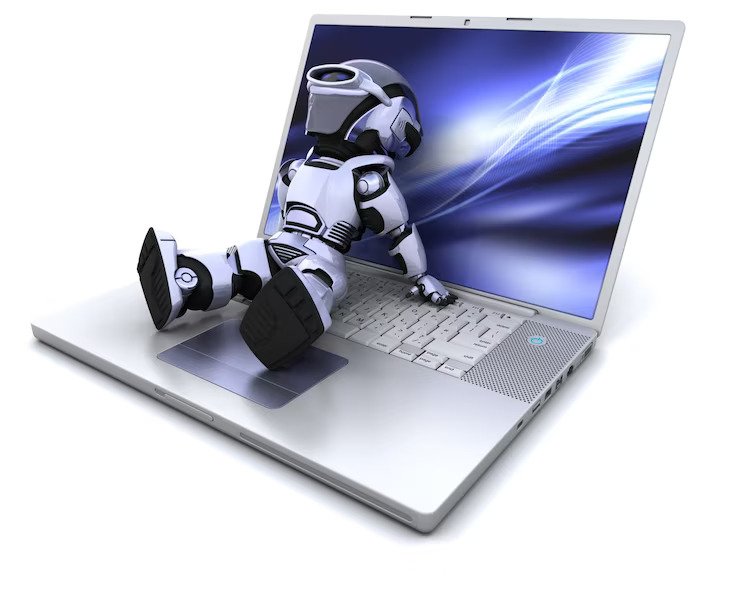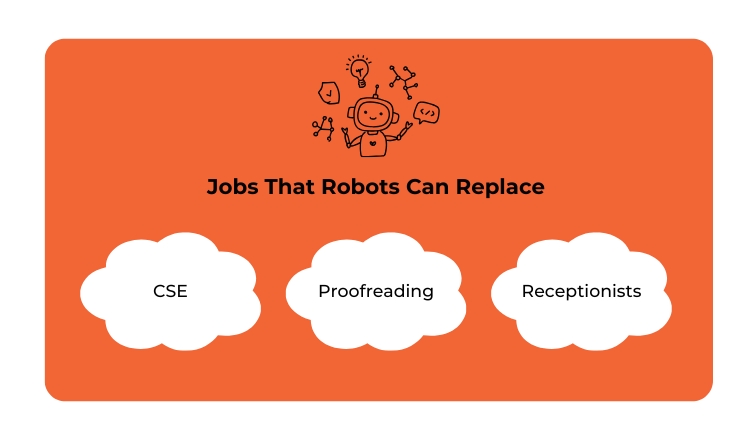Why should you consider taking up robotics as your choice of career? Is it viable or a grand lie that is sold?
6 Mins Read
1 comment
Published on: 26 June 2023
Last Updated on: 15 November 2024

- Understanding Robotic Process Automation
- Why Study a Career or Specialization in Robotics?
- Experts Who Envision The Influence Of AI And Robotics On The Job Sector By 2025
- JP Rangaswami
- Jonathan Grudin
- Ben Shneiderman
- Fred Baker
- Michael Kende
- Robotics is the most innovative career in the world's universities
- Will Robots Take Our Jobs?
- Jobs That Robots Can Replace
- Jobs That Require Human Sentience
- Wrapping It Up
The area of robotics is currently one of the most promising in terms of innovation.
It is one of the areas of knowledge that currently brings the most innovation and one that will create the most opportunities in the present decade, as well as, probably, in future decades.
And it is that a large part of modern industry is highly dependent on the technology that makes the automation of industrial processes possible. In fact, currently, the best-paid careers in the world are those that have to do directly with technological innovation, as well as marketing and programming.
Understanding Robotic Process Automation

We have all seen robots, right? Optimus Prime, T-100, Steve ‘Robocop’ Murphy. Sadly, these are all fictitious, and the actual field of robotics is completely different.
Before we start the discussion on why studying robotics can actually help you get ahead in life, let us first understand what robotics is. Honestly, there is no fixed answer to the question, ‘What is Robotics?’
Robotics and robotic process automation is a multi-disciplinary field where technology meets art. However, if you simplify the term, robotics allows individuals to automate complex tasks and achieve results in a matter of minutes.
This is why the robotics industry is rapidly growing into a giant industry with far-reaching influences. With that note, let us delve deep and try to understand why studying robotics can actually help you.
Why Study a Career or Specialization in Robotics?

Robotics-related careers are exploding in the student market today, and this is because many anticipate that robotics-related jobs will be the highest-paying jobs in the world in the future.
But it is not only limited to factories but many other areas of the economy that will start to use robots for different purposes.
Among them, transportation, the food sector, chemistry, and even medicine and electronics, use robots in their different processes, and soon, they could even populate the streets in the home delivery industry and will gain ground in customer service in many different areas of the economy.
That is why college and technical degrees that focus on robotics will end up dominating much of the job market in the coming years as technology advances by leaps and bounds.
Tools like ABAGY software for robotic welding have specialized teams in different areas of robotics. Many prestigious universities around the world have added different areas related to robotics and machine programming to their career offerings. This also includes innovative areas and specialties in different areas of expertise: different technical careers, medicine, engineering, and much more.
Related: Improve Productivity With These 3 Tech Features
Experts Who Envision The Influence Of AI And Robotics On The Job Sector By 2025
There are some scholarly individuals who have an opinion about how AI and robotics will impact jobs in 2025.
JP Rangaswami
The chief scientists at Salesforce.com pinpoint various reasons that automation will never be a net replacement for jobs in the coming years. As per him, the impacts of this will vary from one economy to another. Moreover, it is driven by constant revolutions in technology as well as education.
Certain classes of jobs might get shifted to the AI and Robotics “immigrants.” However, much of them will be generated in curating and creative activities according to the demand for these services. On the other hand, for several jobs, AI and robots will be a poor substitute for labor.
Jonathan Grudin
The key researcher at Microsoft, Jonathan Grudin, says technology is going to disrupt jobs, although more jobs are likely to come into existence. There were thousands of jobs when the global population was just a hundred million people. But that’s not the scenario now. There is absolutely no shortage of things we need to do now.
Ben Shneiderman
Being a computer science professor at Maryland University, Ben says both AI and Robotics are worth compelling journalist stories. However, they are just a depicted vision of major financial changes. Journalists had to give up on their jobs due to advertising changes. But robotics cannot threaten the sector entirely.
Enhanced user interfaces, self-reliant customers, and electronic delivery might reduce the need for jobs. Simultaneously, a person constructing new websites and creating new products will require human intervention in place of robotics.
Fred Baker
Fred Baker is an Internet pioneer as well as a prolonged IETF leader. He says that his observation of automation advances are determinants of changing jobs. But it cannot reduce them. A vehicle guiding its functionalities on a striped street will find it difficult when moved to an unstriped street.
Automated systems might handle events they are designed for but not for unpredictable events. There might be a lot of changes in the coming years.
Michael Kende
Michael Kende, an economist for major NGOs, has said that with every wave of computerization and automation, productivity will increase. Also, it will have zero impact on employment, and there is absolutely no reason to consider this is not true.
In general, the new wave will possibly increase productivity, both in professional and personal terms. Although robots might displace a certain number of manual jobs, they cannot entirely rule the sector. On the other hand, there will be the need for a person to code as well as build newer tools.
Robotics is the most innovative career in the world’s universities

Although it is true that robotics is not a new industry, since it has been used for industrial purposes for decades. However, thanks to advances in artificial intelligence and the creation of new and better equipment that can serve in many other areas in the future.
Of course, we can also include among the “careers” related to robotics the specializations of other careers that use this type of technology to carry out much more precise work.
Some universities, such as the University of the West of England, Harvard, the University of Bristol or the University of Alicante in Spain, as well as the Massachusetts Institute of Technology, have reinforced their offers of careers and specializations to increase.
The latter is one of the pioneering universities in the United States in technical, engineering, and, in general, the training of professionals within the area of technology. According to the needs of the labor market, studies in technology, artificial intelligence, and robotics, careers that, in the future, promise to be some of the most prized.
Will Robots Take Our Jobs?
AI and Robots can really help businesses automate processes. For example, a process that was done in seven days can now be finished in a matter of hours with higher rates of accuracy.
As a result, more and more businesses have resorted to replacing human beings, and this raises an important question. Will robots take our jobs? Honestly, there is no telling what the future holds.
As a result, we have decided to discuss some jobs that robots can do better and some jobs that require human sentience.
Jobs That Robots Can Replace

Getting replaced by a robot at your job sounds like a scary thing. However, it is a reality most people might face in the upcoming years. Here are some of the most prominent jobs where robots can replace humans:
- CSE: Customer service executives run the highest risk of getting replaced by robots or AI due to the question-answer nature of the job.
- Proofreading: Grammarly has already proven itself more than capable of proofreading your written content. As a result, most companies have completely shifted to automated proofreading services since they are cheaper and more accurate.
- Receptionists: A receptionist’s job is to check in people and help people with any form of queries. As a result, a program can be created that can auto-check people without any hassle.
Jobs That Require Human Sentience

Just as there are jobs that AI can take over, there are also some jobs that enjoy natural immunity. In other words, these jobs employ higher levels of people skills that AI cannot replicate. Here they are:
- Chef: AI and robotics can create machines that can help people cook. You will still need a chef to make the food taste better.
- Human Resource Executives: HR executives deal with human beings and nuances of human behavior. Therefore, it will be impossible for AI to understand as humans can be unpredictable. As a result, HR executives will never be replaced by AI.
Wrapping It Up
That is why we can affirm that studying for a career or doing a postgraduate degree in robotics is one of the most successful decisions today. It has been spread that studying at the university does not have much value today, but the facts indicate the opposite, you simply must know how to choose the career to be studied.
Read Also:


















1 comment
zoritoler imol July 5, 2023 at 10:41 pm
Very interesting information!Perfect just what I was looking for! "To be without some of the things you want is an indispensable part of happiness." by Bertrand Russell.